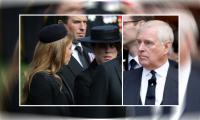Iran blames Yemen president for crisis in Sanaa
TEHRAN: Iran warned on Tuesday of possible “disintegration or civil war” in Yemen, criticising President Abedrabbo Mansour Hadi for leaving the capital Sanaa and basing himself in the southern city of Aden.The comments, by deputy foreign minister Hossein Amir Abdollahian, came after Gulf monarchies agreed to Hadi’s request to host
By our correspondents
March 11, 2015
TEHRAN: Iran warned on Tuesday of possible “disintegration or civil war” in Yemen, criticising President Abedrabbo Mansour Hadi for leaving the capital Sanaa and basing himself in the southern city of Aden.
The comments, by deputy foreign minister Hossein Amir Abdollahian, came after Gulf monarchies agreed to Hadi’s request to host talks in Riyadh aimed at pulling Yemen out of political crisis.
Abdollahian told the ISNA news agency: “Sanaa is the official and historical capital of Yemen and those in Aden who back disintegration or civil war are responsible for the consequences.
“Yemen’s outgoing president would have done better to stay in Sanaa and keep to his resignation letter and not lead the country into crisis.”
Iran, a regional power, is accused of having contributed to the seizure of power in Sanaa by Huthi militia, but Tehran has rejected accusations of interference. Tehran “supports the unity, independence and a wide national dialogue in Yemen,” Abdollahian said.
Hadi tendered his resignation to parliament in January but parliament never convened and he withdrew it after escaping to Aden last month, saying he quit under duress from the Huthis.
Hadi asked the Gulf countries to host talks after failing to reach agreement with the militia and their backers on a venue inside Yemen.
The six Gulf states are deeply suspicious of the Huthis, fearing they will take Yemen into Iran’s orbit.
UN-brokered reconciliation talks, which had been taking place in Sanaa, broke down after Hadi’s flight to Aden.
Yemen, on the frontline in the US war against al-Qaeda, has been gripped by unrest since longtime president Ali Abdullah Saleh stepped down in early 2012 after a bloody year-long uprising.
Several Gulf states, led by Saudi Arabia, have moved their embassies to Aden after an exodus of foreign diplomats from Sanaa in February over security concerns.
Meanwhile, Iranian Foreign Minister Mohammad Javad Zarif told top clerics on Tuesday a letter from Republican senators undermining a possible nuclear deal had sapped Tehran’s confidence in dealings with the United States.
Extending his criticism of the open letter, whose 47 signatories included several potential 2016 presidential candidates, Zarif said: “This kind of letter is unprecedented and undiplomatic. In truth, it told us that we cannot trust the United States.”
Zarif’s remarks, reported by the Isna news agency, came in Tehran at a meeting of the Assembly of Experts, Iran’s top clerical body, where he gave an update on the negotiations with world powers for a comprehensive agreement on Iran’s nuclear programme.
He said on Monday that the letter had “no legal value”.
Effectively undercutting the White House, the senators wrote that President Barack Obama is in office only until January 2017, and a successor could scrap the agreement if Congress has not approved it.
While Iran and the United States are longtime foes, Zarif and his negotiating team have consistently said that the nuclear talks have been conducted in a good and serious atmosphere.
However he added on Tuesday: “Negotiations with the United States are facing problems due to the presence of extremists in Congress.”
The Republicans’ letter appeared to be another bid to influence or even derail the talks between Iran and the P5+1 powers — Britain, China, France, Germany and Russia as well as the United States.
It also marked a rare foray by Congress into foreign policymaking, as US negotiations with other governments are a responsibility typically handled by the executive branch, not lawmakers.
Obama pilloried the letter, comparing the senators to Iranian MPs who seem opposed to detente, saying he would make his case for any possible nuclear deal to voters.
“It is somewhat ironic to see some members of Congress wanting to make common cause with hardliners in Iran,” he said.
With a March deadline looming, negotiators are furiously working to agree the political outlines of a deal that would curb Iran’s nuclear programme in return for the lifting of Western sanctions.
The fine details of the accord are meant to be settled by the end of June but Iran’s supreme leader, Ayatollah Ali Khamenei, has criticised the two-step process, saying matters should be handled in one sweep.
A new round of talks between Zarif and US Secretary of State John Kerry is due to take place in Lausanne, Switzerland on Sunday.
The comments, by deputy foreign minister Hossein Amir Abdollahian, came after Gulf monarchies agreed to Hadi’s request to host talks in Riyadh aimed at pulling Yemen out of political crisis.
Abdollahian told the ISNA news agency: “Sanaa is the official and historical capital of Yemen and those in Aden who back disintegration or civil war are responsible for the consequences.
“Yemen’s outgoing president would have done better to stay in Sanaa and keep to his resignation letter and not lead the country into crisis.”
Iran, a regional power, is accused of having contributed to the seizure of power in Sanaa by Huthi militia, but Tehran has rejected accusations of interference. Tehran “supports the unity, independence and a wide national dialogue in Yemen,” Abdollahian said.
Hadi tendered his resignation to parliament in January but parliament never convened and he withdrew it after escaping to Aden last month, saying he quit under duress from the Huthis.
Hadi asked the Gulf countries to host talks after failing to reach agreement with the militia and their backers on a venue inside Yemen.
The six Gulf states are deeply suspicious of the Huthis, fearing they will take Yemen into Iran’s orbit.
UN-brokered reconciliation talks, which had been taking place in Sanaa, broke down after Hadi’s flight to Aden.
Yemen, on the frontline in the US war against al-Qaeda, has been gripped by unrest since longtime president Ali Abdullah Saleh stepped down in early 2012 after a bloody year-long uprising.
Several Gulf states, led by Saudi Arabia, have moved their embassies to Aden after an exodus of foreign diplomats from Sanaa in February over security concerns.
Meanwhile, Iranian Foreign Minister Mohammad Javad Zarif told top clerics on Tuesday a letter from Republican senators undermining a possible nuclear deal had sapped Tehran’s confidence in dealings with the United States.
Extending his criticism of the open letter, whose 47 signatories included several potential 2016 presidential candidates, Zarif said: “This kind of letter is unprecedented and undiplomatic. In truth, it told us that we cannot trust the United States.”
Zarif’s remarks, reported by the Isna news agency, came in Tehran at a meeting of the Assembly of Experts, Iran’s top clerical body, where he gave an update on the negotiations with world powers for a comprehensive agreement on Iran’s nuclear programme.
He said on Monday that the letter had “no legal value”.
Effectively undercutting the White House, the senators wrote that President Barack Obama is in office only until January 2017, and a successor could scrap the agreement if Congress has not approved it.
While Iran and the United States are longtime foes, Zarif and his negotiating team have consistently said that the nuclear talks have been conducted in a good and serious atmosphere.
However he added on Tuesday: “Negotiations with the United States are facing problems due to the presence of extremists in Congress.”
The Republicans’ letter appeared to be another bid to influence or even derail the talks between Iran and the P5+1 powers — Britain, China, France, Germany and Russia as well as the United States.
It also marked a rare foray by Congress into foreign policymaking, as US negotiations with other governments are a responsibility typically handled by the executive branch, not lawmakers.
Obama pilloried the letter, comparing the senators to Iranian MPs who seem opposed to detente, saying he would make his case for any possible nuclear deal to voters.
“It is somewhat ironic to see some members of Congress wanting to make common cause with hardliners in Iran,” he said.
With a March deadline looming, negotiators are furiously working to agree the political outlines of a deal that would curb Iran’s nuclear programme in return for the lifting of Western sanctions.
The fine details of the accord are meant to be settled by the end of June but Iran’s supreme leader, Ayatollah Ali Khamenei, has criticised the two-step process, saying matters should be handled in one sweep.
A new round of talks between Zarif and US Secretary of State John Kerry is due to take place in Lausanne, Switzerland on Sunday.
-
 ASAP Rocky Recalls 'embarrassing' First Meeting With Rihanna
ASAP Rocky Recalls 'embarrassing' First Meeting With Rihanna -
 Archie, Lilibet’s Chances At Meeting King Charles Get Promising Update: Here’s Why
Archie, Lilibet’s Chances At Meeting King Charles Get Promising Update: Here’s Why -
 Claire Foy Shares Rare Views On Typecasting Amid New Gig
Claire Foy Shares Rare Views On Typecasting Amid New Gig -
 Britney Spears Raves About Madonna In New Social Media Post
Britney Spears Raves About Madonna In New Social Media Post -
 Hailey Bieber Shares Sweet Snap Of Husband And Baby
Hailey Bieber Shares Sweet Snap Of Husband And Baby -
 Therapist Killed In Office As Former Client Launches Knife Attack
Therapist Killed In Office As Former Client Launches Knife Attack -
 Gaten Matarazzo Brands 'Stranger Things' Final Scene 'nerve-racking'
Gaten Matarazzo Brands 'Stranger Things' Final Scene 'nerve-racking' -
 David Beckham Speaks Out After Son Brooklyn Beckham's Shocking Post
David Beckham Speaks Out After Son Brooklyn Beckham's Shocking Post -
 Sophie Turner Gets Candid About 'imposter Sydrome' Post 'GOT'
Sophie Turner Gets Candid About 'imposter Sydrome' Post 'GOT' -
 When Nicola Peltz's Boyfriend Anwar Hadid Found Solace In Dua Lipa's Arms
When Nicola Peltz's Boyfriend Anwar Hadid Found Solace In Dua Lipa's Arms -
 Claire Foy Reveals Rare Impact Of 'The Crown' Gig On Career
Claire Foy Reveals Rare Impact Of 'The Crown' Gig On Career -
 Megan Thee Stallion Teases New Music On The Way
Megan Thee Stallion Teases New Music On The Way -
 Blonde Kate Stuns In Photos With Prince William During Rare Joint Engagement
Blonde Kate Stuns In Photos With Prince William During Rare Joint Engagement -
 Kate Gosselin Reveals Harrowing Moment Thief Nearly Took Her Down
Kate Gosselin Reveals Harrowing Moment Thief Nearly Took Her Down -
 Billy Bob Thornton Weighs In On Contrast To 'Landman' Role
Billy Bob Thornton Weighs In On Contrast To 'Landman' Role -
 Amanda Holden May Swap Position To Different Reality Show: See Which
Amanda Holden May Swap Position To Different Reality Show: See Which



